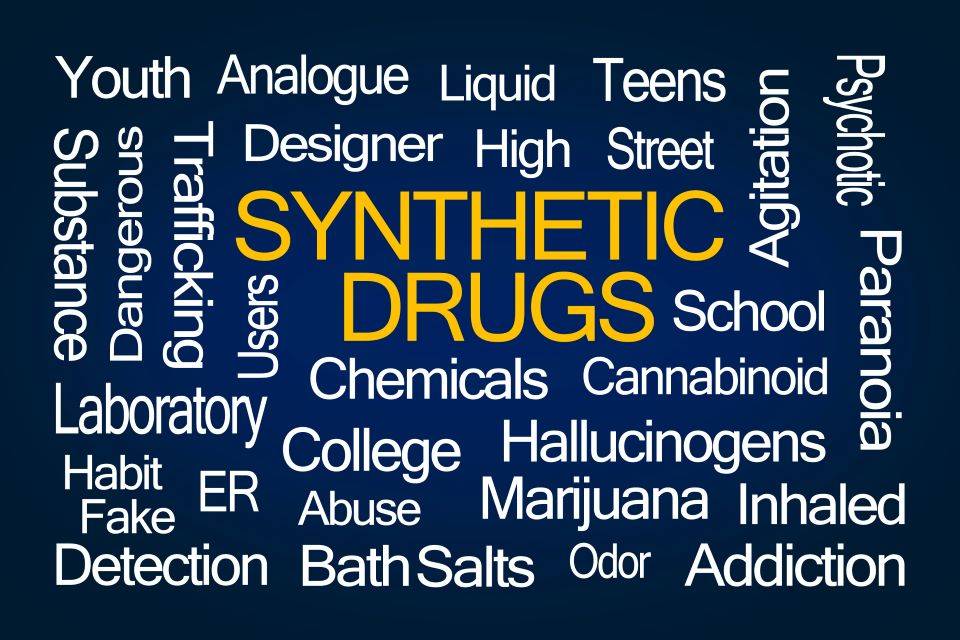How Dangerous are Synthetic Drugs?

Commonly referred to by other names such as designer or club drugs, synthetic drugs are a class of substances specially designed to mimic the effects of other illicit drugs. This can include marijuana, cocaine, amphetamines and heroin. They stand out because unlike the drugs that they are trying to mimic, being synthetic means that they are chemically produced in a lab rather than derived from natural sources. In many cases, this makes the drugs more dangerous, although it does reduce their cost, often boosting sales when compared to their natural counterparts.
Most synthetic drugs are produced outside the United States in East Asia and then trafficked in. Many of them are technically legal, but several states have been making an effort to ban them due to their potentially harmful side effects. The two most common types of synthetic drugs are stimulants, such as Bath Salts and cannabinoids, such as Spice and K2.
The complicated nature of synthetic drugs makes it difficult to truly understand the risks that are associated with using them. However, it has become clear that they are hazardous to a person’s health, and likely even more dangerous than the natural drugs that they are trying to mimic. Here are 8 things you should know about synthetic drugs:
1. Identifying Ingredients
The goal of synthetic drugs is to reproduce the feelings and effects of a natural drug. Those who produce and manufacture these substances use a wide array of chemicals to create the desired effect, many of which are extremely dangerous, such as rat poison. This variety of options and lack of regulation on synthetic drug creation means that it is incredibly difficult for medical professionals and scientists to predict what a particular batch will be made of.
According to the DEA, there are more than 200 different confirmed compounds used for designer drugs, over 80 of which are for marijuana alone. The other confirmed compounds were a mix between stimulants and hallucinogens, with stimulants being the more common option of the two.
2. Not Tested on Humans
The lack of regulation on synthetic drugs and the fact that most are produced outside the United States, typically in China, means that their ingredients are not subjected to the same rigorous testing as medical substances. As a result, a large portion of the ingredients that had been found in synthetic drugs are chemicals whose effects have never been properly tested on humans. This means that there is no way to truly know what effect a particular synthetic drug will have on a user, particularly in higher doses or with long–term use.
3. Regulation
Synthetic drugs are tricky to ban for a variety of reasons. When they first rose to popularity in the United States, officials underestimated how dangerous they were and how easy they were to obtain. Synthetic drugs can be purchased over the internet and are often sold at convenient stores and gas stations.
In many cases, these products are sold in the US with a packaging label that reads “not for human consumption.” By providing this label, it allows store owners to bypass the Controlled Substance Analogue Enforcement Act while also hiding the product’s true intent from government officials. Some of the common options that a synthetic drug may be mislabeled as include “bath salts,” “research chemicals,” or “plant food.” New nicknames and mislabeled names are constantly being developed as sellers and users attempt to stay one step ahead of the police.
4. Altering Chemical Makeup
When government officials are able to identify the chemical compound within a synthetic drug and then pass a law to make it illegal, it is only able to provide a small delay in sales. Since there are so many different compound options that can mimic the effects of other drugs, synthetic drug producers simply alter the chemical makeup of their product in order to avoid the most recent legislation. By the time they are caught again, they will have already made an unimaginable number of sales and can easily just move on to a different chemical makeup once more.
5. Detection
Since synthetic drugs come in such a wide array of forms and are mislabeled in so many ways, it is tough for both government officials and the public to recognize them without having insider knowledge. This makes it difficult to identify products and pass new legislation against them, as well as warn the public so that they can protect themselves from mislabeled products. Their presentation also varies quite a bit, and a synthetic drug can appear in a package meant to mirror anything from a bath salt to chewing tobacco.
6. Unpredictable Effects
While the intent of synthetic drugs is to mirror the effects of another drug like a stimulant or marijuana, there is no way to truly know what a particular compound’s effects will be before a user takes it. This is a result of the lack of regulation and proper testing that goes into these products before they are sold.
In general, these drugs are abused by recreational users for the pleasurable high that they produce. However, because of the other compounds in them, they frequently cause unexpected alternate effects. These can be somewhat predicted based on the type of substance the synthetic drug is attempting to mimic, but never to the same degree.
Some of the potential symptoms of synthetic drug abuse include:
- Heightened anxiety
- Paranoia
- Hallucinations
- Seizures
- Fits of aggression
- Nausea and vomiting
- Loss of consciousness
- Death
7. Just as Addictive as Other Substances
There is a common misconception that since many synthetic drugs can be purchased legally, they must not be addictive. However, this is far from the truth and synthetic drugs can easily lead to addiction. In some cases, they can even be more addictive and dangerous than their natural counterparts. For example, the cannabinoids found in synthetic products tend to bind more strongly to receptors in the brain than THC in marijuana does. This increases the mind-altering effects of the drug, in turn raising its addictive risk.
8. Long-Term Damage
With long–term abuse, synthetic drugs can cause permanent damage to a user’s mind and body. While this is a common risk when abusing nearly any type of drug, it is especially serious when dealing with synthetic drugs because the user has no way to know exactly what they are putting into their body.
Many of the compounds that make up synthetic drugs are composed of chemicals that are dangerous before they even react to each other. Moreover, each one raises the risks associated with taking the drug when they are combined. Since new batches are constantly changing their chemical makeup, it is practically impossible to predict how much of a health hazard a particular synthetic drug will present until it is too late. As a result, regular synthetic drug users run the risk of causing permanent damage like memory loss, paralysis, and IQ deficiencies whenever they use the drug.
Get Help for Synthetic Drug Addiction Today
Synthetic drug abuse is a growing problem in the United States that stubbornly persists because of the many ways that manufacturers can circumnavigate drug laws. Addiction to these substances is even more prominent based on their easy accessibility. Moreover, serious harm increases tenfold when we consider the unpredictable nature of synthetic drugs.
If you or a loved one is struggling with synthetic drug abuse, please seek help immediately. There is no way to really know how you will react to the effects of synthetic substances, so it is imperative to consult with an addiction treatment professional before it is too late. Please call us today at (855)575-1292 to learn more about our program and see how we can help.

